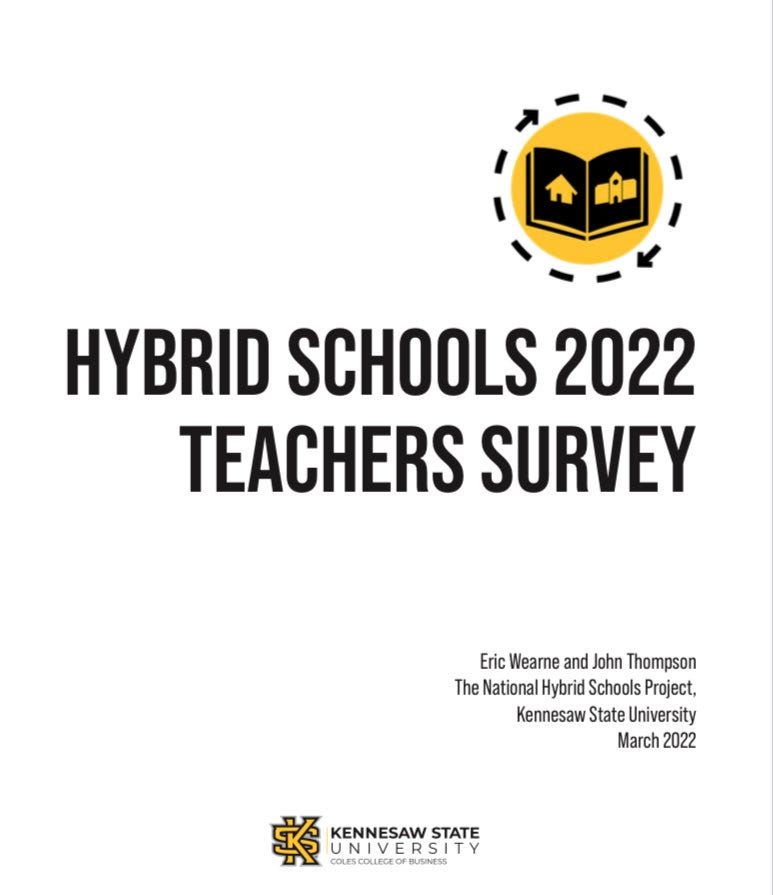Reporting on Hybrid School Teachers
The National Hybrid Schools Project here at Kennesaw State recently released the results of another first-of-its-kind survey. We asked hybrid school teachers from around the country about their backgrounds and experiences in hybrid schools. Here are just a few of the topics the report covers. (I will make some comparisons between our results and those from the most recent NCES “Characteristics of Public and Private Elementary and Secondary School Teachers in the United States” report. Those comparisons aren’t empirical or scientific; I’ll just provide them to give readers someplace to orient themselves).
Degrees and College Coursework. The most common degree for hybrid teachers is a general elementary grades degree (17.4 percent), followed by “early childhood,” English, and Biology (each at 4.6 percent).
We asked hybrid teachers whether they had the following undergraduate or graduate coursework prior to teaching:
-classroom management techniques
-lesson planning
-learning assessment
-using student performance data to inform instruction
-serving students from diverse backgrounds
-serving students with special needs.
Less than half of hybrid school teachers reported taking courses in any of these areas before teaching. One can make a case for the relative importance of any of these topics. One might also argue that this signals the relative unpreparedness of hybrid school teachers. But: in the NCES report, fewer than half of private school teachers reported taking courses on half of these topics either! (using student performance data to inform instruction, serving students from diverse backgrounds, or serving students with special needs).
Job Satisfaction and Pay.
We hear a lot about low teacher morale. The hybrid school teachers responding to our survey seem to be something of a counterexample. 97.9 percent of hybrid school teachers in our survey said they were "somewhat" or "strongly" satisfied with being a teacher at their school, 95.8 percent of teachers agreed with the statement: "Most of my colleagues share my beliefs and values about what the central mission of the school should be." Morale problems often seem to come at least in part from a conflict between a school’s leadership/purpose, and the teachers themselves, or even among the teachers. Hybrid schools seem to have teachers whose beliefs are better-aligned with each other and with the overall missions of their schools.; Hybrid schools’ natures as smaller, higher-identity institutions with specific goals and shared cultures may be playing a positive role here.
While hybrid school teachers’ work satisfaction looks high, their salaries look low, compared to teachers at five-day private schools. Hybrid school teachers’ annual salaries in our survey averaged around $35,000, compared to $52,900 in conventional private schools. (This $35,000 may even be an overstatement, as we had a large share of charter school respondents to our survey, while the universe of hybrid schools tends toward more private schools). Hybrid school teachers are often very part time, often teaching only one or two classes for a few days per week, and so there is also a chance that some make salaries a little bit closer to the private school average, while others make only a few thousand dollars per year (by choice), as they only teach a class or two per week.
Responses to COVID.
Like many other private schools, hybrids seem to have leaned toward re-opening as soon as they could after COVID hit. I love noting the story of how in fall 2020, the largest school system announced it would start the school year fully online, and four hours later the Catholic Archdiocese announced it would open its school for live instruction (with an online option). It is important to document this now, as some people are trying/will try to retcon their activities during COVID to say they didn’t really support closures.
We have talked for a long time about how to get new people, and new kinds of people into K12 classrooms, just for part of the time. Why shouldn’t a local pharmacist in a rural town be able to swing by a school and teach a chemistry class? Why shouldn’t a local author be able to do the same for just one English course? Or an engineer for a math class? These people might want to keep their careers, but would be willing to devote some fraction of their time during the week to helping schools fill instructional needs, and they’re qualified in practice to do so. But there is the problem – they’re qualified in the sense that they know the content, but they’re not credentialed. State teacher certification is often the hurdle and states have talked for years about how to carve out workarounds to get these kinds of people into schools in this way. Sometimes it works. But in many hybrid schools, it’s standard operating procedure, often especially in the high school grades. Another new paper talks about the issue of teachers who want to stay in teaching but really need a new environment. Not seeing that environment on offer, they’re starting their own schools. “Leaving a Classroom but Starting a School” consists of the results of a focus group of Florida teachers. They did not necessarily start up hybrid schools, but their motivations will sound extremely familiar to those who have.
A piece related to the report notes,
“School choice creates the opportunity for entrepreneurial educators to start and operate schools aligned to their strengths and their beliefs about how children should be educated. Oftentimes teachers are stuck in the very same schools that children are.”
For teachers looking for opportunities to make themselves happier and stay in the classroom: hybrid schools are out there.




